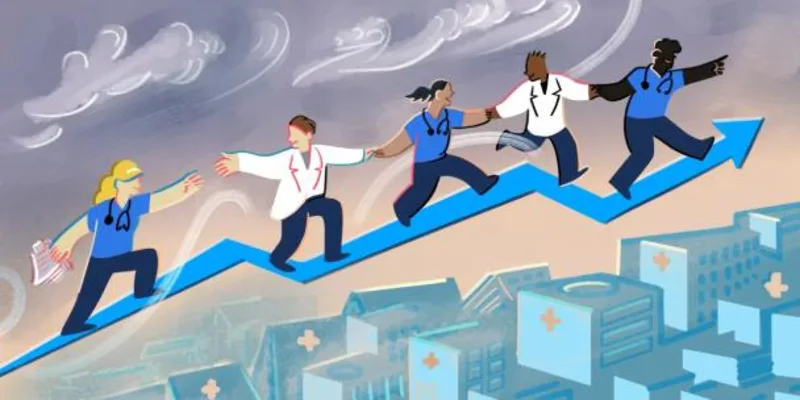
The first time I stepped into the OR and participated in my first surgery, I knew it was where I wanted to be for the rest of my life. I didn’t know, however, how far down the rabbit hole I’d wind up.
Coming from an osteopathic school that is dedicated to producing well-rounded, personable, outstanding primary care physicians, surgery wasn’t a very common topic of conversation. When it came time to decide how to plan my fourth year, it seemed like I sent a shockwave through my school. I wasn’t the first from my school (and I’m sure I won’t be the last one) to pursue surgical training, but by far and away the decision was considered “off the beaten path.”
Initially, I thought that if I put my head down, worked hard, and persevered, then I would be a successful student and one day a successful surgeon. Truthfully, that was probably the worst thing I could have done, as I learned social isolation is the antithesis of what makes a strong student and surgeon.
What I really needed was a mentor, or someone to show me the way and help me see the path forward. Two years of hard work and searching finally led me to San Diego to learn more about being the best mentee I could be at the American Association for Thoracic Surgery’s Member for a Day symposium, a program dedicated to helping educate surgical trainees on their way to a successful career. Seasoned surgeons, chairs, department heads, R01 NIH-funded academics all spoke at the symposium about the critical importance of mentorship, each claiming that without it they wouldn’t have been nearly as successful in their field.
Mentor: A Trusted Counselor or Guide
First, some historical context: The word “mentor” originated from Homer’s Odyssey. The education and training of Odysseus’ son is entrusted to Mentor, the kings nobel friend. Now, the term refers to someone who helps guide you on your career path, offering resources and advice at every turn.
In 2010, the ACS published a briefing on the aging demographic of surgeons, identifying the inevitable fact that the population is getting older, and a new guard is needed. For Cardiothoracic Surgery, the current mean age of a surgeons is 62 and the percent of surgeons under the age of 40 is less than 15 percent. Now more than ever mentees need mentors — perhaps even more so the other way around. It’s time that we students, surgeons, sponsors, mentors, and mentees turn and look to the future to come together and collaborate to enhance the transfer of medical and surgical knowledge to mutually grow and better ourselves and our patients.
Mentorship is a mutual relationship of give and take, not a one-way street. One of the most common pitfalls is thinking that simply serving as a mentee means you have somehow delivered your side of the obligation. Rather, the mentor serves as the guide, while the mentee is the work horse.
Most medical students are more accustomed to having an advisor, not a mentor. An advisor offers you information and facts, and can help expose you to information you may not have known. A mentor, on the other hand, is someone who has actually gone through the process of entering a higher field of practice and has gained the insight and experience of something by participation in it and is personally invested in your own specific success. They are dedicated to your advancement and learning, building mentees up and developing them for future success. However, this may not always easy; at some points in life you may even need “tore-”mentors, or someone to push you to do and be better.
Sponsor: A Person Who Takes Responsibility for Some Other Person or Thing
To reiterate, a mentor is someone you talk with to help guide and develop your career. But who is going to talk about you to others?
The concept of sponsorship is much less discussed compared to mentorship, but equally critical to advancement. Sponsorship is a much more common philosophy and practice in the world of business, but is just as relevant to success and promotion in medicine. A sponsor is someone who talks you up to people and administrators. They are the ones who “brag” about you when you’re not around and help nominate you for further advancement. Sponsors seek to put people up for task and help advance mentees through actions and their wider connection of influence. Your sponsor and mentor be the same person, of course, but often they are not.
Finding the Right Fit
Often students ask “how do I choose a mentor?” and the truth is it’s difficult. Being open to guidance and input from others is the first step. During my third-year surgical rotation, I had the opportunity to rotate on the surgical service for ten weeks, and my passion was ignited. All I had to do was look up, and there standing in front of me stood my first mentor. When I expressed my interest in surgery, they encouraged me to look to professional organizations like the American College of Surgeons and the Society of Thoracic Surgeons. This helped guide my dive deeper into the specialty and discover what opportunities were out there, helping me forage my path towards surgery.
Finding the right mentor is something that takes effort, time, and some level failure. Mentorship is something that students should look for in every aspect of their future specialties (i.e. a research mentor, a clinical mentor, and lifestyle mentor). The three don’t have to be, and probably shouldn’t be, confined to a single person. All of these people can serve as valuable resources to help students navigate their future goals.
Mentors come in all shapes and sizes. One prime example is peer mentors, or people of a similar or slightly elevated position that can serve as a resource, ranging from current residents to medical students. While one advanced mentor may encourage you to pursue surgery and help you identify areas of interest, connect with clinical and research opportunities, they may be a little far removed from the residency application process.
Find a surgeon, a mutually interested student, a resident and tell them you’re interested. The people passionate enough to sacrifice weekends and vacations to advance and promote their work and organizations. Start by speaking with the people at your hospital. You can also visit the American College of Surgeons website, which has programs dedicated to mentorship.
We exist as trainees in a very risk averse time, constantly wondering, “Is this new therapy safe, what’s the risk?” Or, “What if I fail this test?” “Is this surgery to dangerous?” While some of those decisions may indeed be too much of a risk, extending oneself to connect with a mentor is never a risk not worth taking.
Whether you go to Harvard Medical School, an Osteopathic school, or an international medical school, each of us needs a mentor and it’s up to us as a future mentee to seek them out. To take the time to put in the work and development for our own futures, and the future of our patients. We all need mentors, especially in surgery. This is a trade, a true practice, a skill and honor earned in time, and we need the advice, guidance, and support of those who came before us.
Benjamin Kramer is a medical student at the New York Institute of Technology’s College of Osteopathic Medicine.







